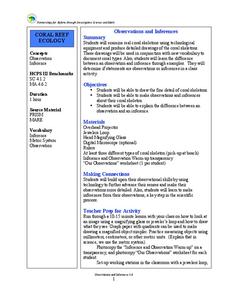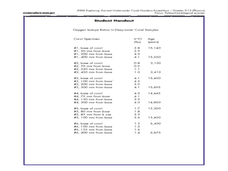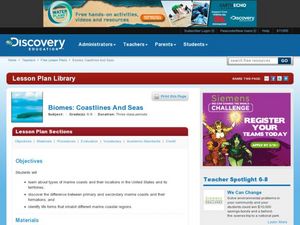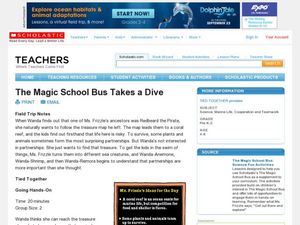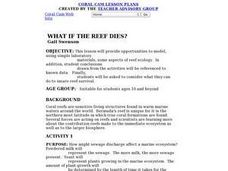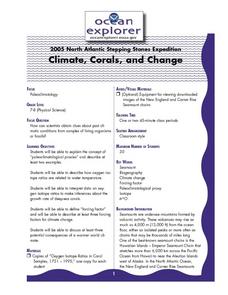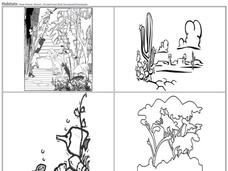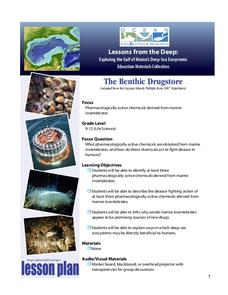Curated OER
Observations and Inferences
Students examine coral skeletons. In this science lesson, view real coral skeletons. Students explain the differences between an observation and an inference. Students draw a coral skeleton.
Curated OER
How can deep-water corals be used to determine long-term patterns of climate change?
Young scholars explore the concept of paleoclimatological proxies. In this paleoclimatological proxies lesson, students explain isotope ratios in deep water coral samples. Young scholars write a paragraph about global climate...
Curated OER
The Great Barrier Reef
In this Great Barrier Reef instructional activity, students complete a set of 8 questions about Australia's Great Barrier Reef. No reference for information is given; origin of instructional activity is printed on bottom of page.
NOAA
Biological Oceanographic Investigations – Call to Arms
How many simple machines does it take to make a robotic arm? An inquiry-based lesson explores that topic and challenges pupils to build a robotic arm that can stretch, turn, and more. A few questions help guide them in the...
Curated OER
Treasures in Jeopardy
Pupils compare and contrast deep sea coral reefs to shallow water reefs. In this coral reef lesson students develop a poster that could be used to educate the public about the importance of coral reefs.
Curated OER
Coral Reef Choreographic ProjectTo
Students enhance their understanding of how animals function in a habitat.Students are scattered individually and in small groups. About half of students make coral shapes in small groups. The other half of students move like animals in...
Curated OER
Biomes: Coastlines and Seas
Students study the different types of coastlines and their territories. For this marine coasts lesson students identify life forms that are in the coastal regions.
NOAA
Why is Hawaii's Ocean Important?
Studying the oceans? Focus on Hawaii's ocean with a resource packed with activity-based worksheets. Everything from products that come from the ocean to the abundance of plants and animals that call the ocean their home, Hawaii's ocean...
American Museum of Natural History
Dive Into Worlds Within the Sea
Make connections between ocean organisms. Individuals explore three different ecosystems in the ocean. With an online interactive, they learn how different organisms depend upon each other. Learners first answer questions to connect...
Curated OER
Great Barrier Reef-Guarding Nemo
Young scholars explore the Great Barrier Reef. In this environmental stewardship lesson, students conduct research regarding the Great Barrier Reef and examine methods to preserve the Reef. Young scholars apply the RAFT method to prepare...
Curated OER
Rainbow Trout
Pupils investigate the many varieties of both tropical and freshwater fish, and find out about the anatomy of these creatures. They explore biodiversity in bodies of water, including information about coral reefs, and study the effects...
Curated OER
A Novel Study Unit for The Cay
Novelly written questions are perfect for a novel study guide unit on The Cay. The well-rounded resource contains an anticipation guide for scholars to complete before reading, a variety of questions per chapter of the book, and a post...
NOAA
Importance of Deep-Sea Ecosystems – What Killed the Seeds?
Most drugs used today come from nature, so the discovery of new ecosystems in the deep sea is exciting from a medical perspective. Scholars develop their own bioassay to test germination rates in seeds.
Aquarium of the Pacific
Ecosystem Comparison
Fifth graders examine plants and animals in two ecosystems and compare them. In this ecosystem survival instructional activity, 5th graders compare and contrast a coral reef and kelp forest ecosystem. Students investigate the...
Curated OER
The Magic School Bus Takes a Dive
Students learn along with Ms. Frizzle's class. In this Magic School Bus lesson plan, students find out how partners can help run a race just as Wanda learns that survival on the coral reef often depends on cooperation.
Curated OER
What If the Reef Dies?
Students complete four activities to investigate how reef ecology can change. They perform experiments to show how sewage discharge can affect a marine ecosystem, look at substances that don't dissolve in water, examine wave action...
Curated OER
Climate, Corals, and Change
Students examine oxygen isotope ratios and how they are related to water temperature. They also identify three forcing factor changes for climate change.
Curated OER
Currents: Bad for Divers; Good for Corals
High schoolers describe, compare, and contrast major forces that drive ocean currents. They discuss the general effects of topography on current velocity. They discuss how velocity affects the ability
Curated OER
Habitats
In this habitats worksheet, learners view and discuss four slides with four different habitats found in the rain forest, desert, ocean/coral reef and in the Savannah/grasslands. Students color each slide with vibrant colors.
NOAA
Importance of Deep-Sea Ecosystems – Chemists with No Backbones
Marine invertebrates offer us many new options for developing pharmaceutical drugs, such as w-conotoxin MVIIA, which is extracted from the cone snail and is a potent painkiller. The activity encourages scholars to research various types...
NOAA
Invertebrates
Crabs and lobsters ... yum! The 18th installment of a 23-part NOAA Enrichment in Marine sciences and Oceanography (NEMO) program focuses on invertebrate marine life. After the lecture slideshow, learners conduct an activity to sample...
NOAA
Importance of Deep-Sea Ecosystems – The Benthic Drugstore
You never know what you will find next in the deep sea ecosystem. So far, scientists have found items that work as anti-tumor agents, anti-inflammatory agents, agents that stop uncontrolled cell division, and much more. The lesson begins...
NOAA
Exploring Potential Human Impacts
Arctic sea ice reflects 80 percent of sunlight, striking it back into space; with sea ice melting, the world's oceans become warmer, which furthers global warming. These activities explore how humans are impacting ecosystems around the...
Curated OER
A Piece of Cake
Students examine life under the sea to discover coral gardens and microhabitats. They demonstrate learning by creating an edible marine ecosystem with a sheet cake, icing, and different candies.
Other popular searches
- Coral Reefs Coloring Pages
- Coral Reefs Lessons
- Ocean Coral Reefs
- Coral Reefs Videos
- Coral Reefs of Australia
- Painting Coral Reefs
- Sharks Coral Reefs
- Coral Reefs of Austraila
- Coral Reefs Tourism
- Coral Reefs Lesson Plans
- Formation of Coral Reefs
- Florida Coral Reefs


